Enjoy a time-honored Japanese tradition with the Tea Ceremony Experience in Kyoto. This intimate gathering offers a chance to learn about the ceremony’s significance, from its four essential elements to the hands-on experience of preparing and tasting matcha green tea. Set in a historic location, the experience accommodates up to seven travelers, promising a captivating cultural journey that reveals the meditative practice rooted in Zen Buddhism. Dive deeper into this serene experience and uncover the tranquility that awaits.
Key Points
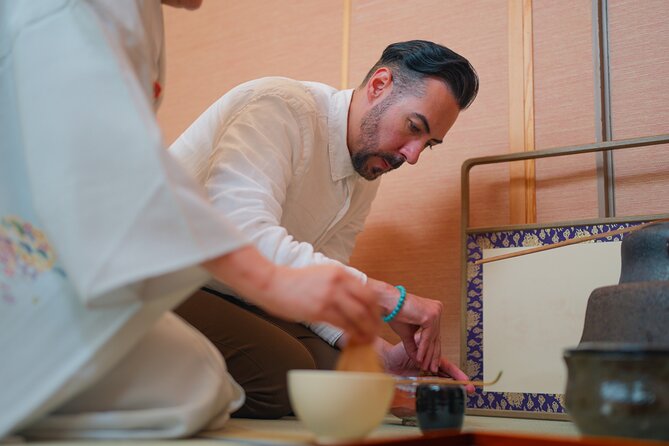
- Immersive cultural practice hosted in historic Kyoto, providing hands-on learning and educational explanations about the tea ceremony tradition.
- Group setting limited to a maximum of 7 travelers, ensuring personalized attention from the knowledgeable host.
- Includes selection of traditional Japanese sweets and matcha green tea, with options for coffee or additional tea varieties.
- Activity starts promptly at the meeting point near JR Hanazono Station, requiring timely arrival via public transportation.
- Tea ceremony emphasizes the four essential elements of Harmony, Respect, Purity, and Tranquility, reflecting the cultural significance of the practice.
Experience Overview
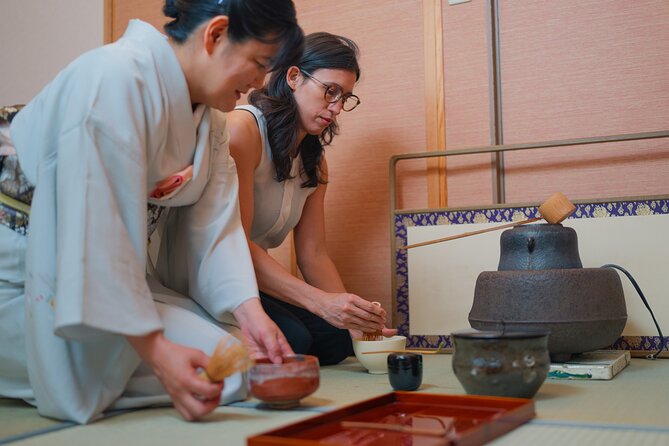
The activity on offer is a tea ceremony experience, allowing visitors to enjoy this traditional Japanese cultural practice in the historic city of Kyoto.
Priced from $134.37 per person, the tea ceremony takes place in a group setting with a maximum of 7 travelers.
Hosted in Kyoto, the experience includes an educational component where guests learn about the ceremony, tea room, and utensils used.
The activity lasts for an unspecified duration, concluding at the original meeting point near JR Hanazono Station.
You can also read our reviews of more tours and experiences in Kyoto.
What’s Included
This tea ceremony experience includes a selection of traditional Japanese sweets and matcha green tea for guests to enjoy.
Participants will also be served coffee or additional tea varieties. Throughout the experience, the host will provide an educational explanation about the tea ceremony, the tea room, and the various tea utensils used.
This hands-on learning allows visitors to gain a deeper understanding and appreciation of this centuries-old Japanese cultural tradition.
With a maximum group size of 7 travelers, the intimate setting ensures personalized attention from the knowledgeable host.
Getting There
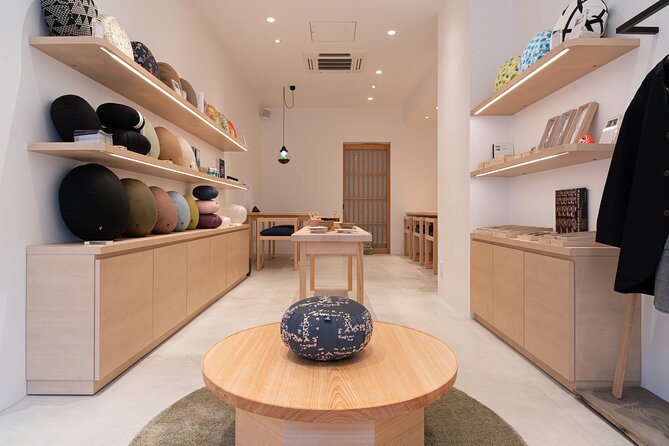
To get to the tea ceremony experience, you will need to make their way to the meeting point located at 19 Uzumasa Izumishikibuchō, Ukyo Ward, Kyoto, 616-8101, Japan.
From JR Hanazono Station, they’ll need to proceed along Prefectural Route 131, pass under the elevated Tenjingawa Dori, and look for a staff member in a kimono.
The activity concludes back at the same meeting point. Participants should allow enough time to arrive as the tea ceremony experience starts promptly at the scheduled time.
The meeting point is easily accessible via public transportation.
Tea Ceremony Traditions
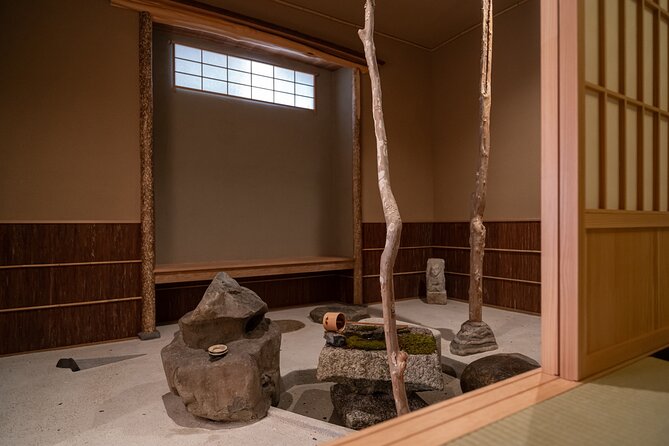
Although steeped in centuries of tradition, the Japanese tea ceremony remains a living, evolving art form.
At its core are four essential elements:
-
Harmony – The tea ceremony emphasizes finding balance and tranquility through the shared experience.
-
Respect – Participants show reverence for the tea, utensils, and environment.
-
Purity – The ritualistic preparation of the tea and cleansing of the tea implements promotes a sense of purification.
-
Tranquility – The slow, meditative movements and restricted conversation foster an atmosphere of calm contemplation.
These principles guide practitioners in preserving the timeless elegance of the tea ceremony while adapting it to modern contexts.
The Tea Room
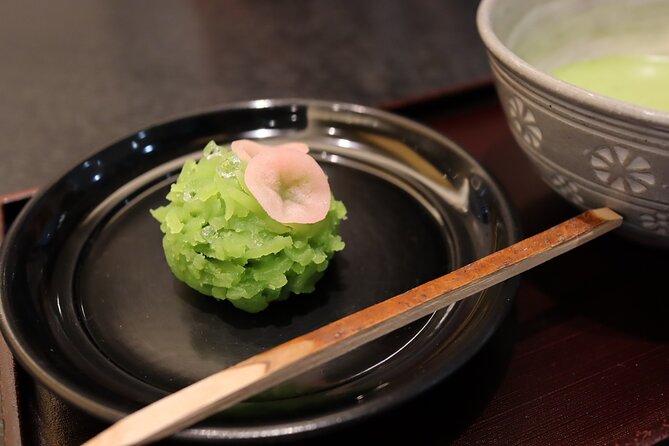
When entering the traditional tea room, visitors are greeted by a serene and minimalist space. The simple yet elegant design allows participants to fully enjoy the ceremony. The tea room features:
| Element | Description |
|---|---|
| Tatami Mats | Woven rush mats that cover the floor, providing a natural, comfortable seating area. |
| Alcove | A recessed wall space that often displays a seasonal scroll or flower arrangement. |
| Tea Utensils | Carefully curated tools used to prepare and serve the matcha, including a tea bowl, whisk, and scoop. |
| Charcoal Brazier | Used to heat the water for the tea, emitting a gentle warmth and fragrance. |
| Tokonoma | A raised alcove where the host places the honored scroll or flower arrangement. |
Tasting the Tea
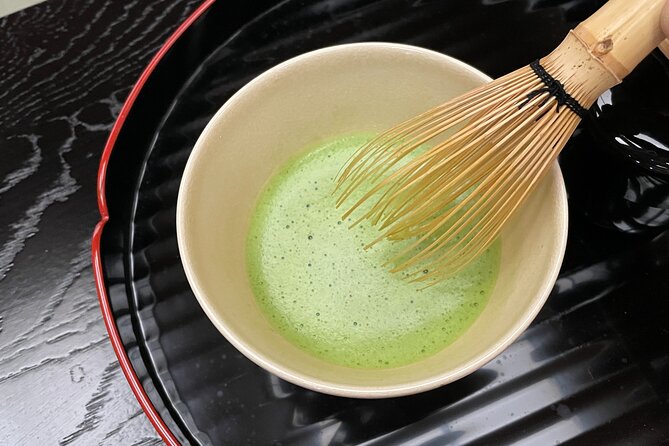
The tea ceremony participants eagerly await the moment when they can savor the carefully prepared matcha.
The host delicately pours the vibrant green powder into each guest’s bowl, adding hot water and whisking the mixture into a frothy, emerald elixir.
The guests take turns sipping the earthy, umami-rich beverage, savoring its complex flavors and aromas:
- Grassy and herbaceous notes from the high-quality powdered green tea.
- A subtle sweetness that balances the astringent tannins.
- A rich, creamy mouthfeel from the thorough whisking.
- A long, refreshing finish that lingers on the palate.
Cultural Significance
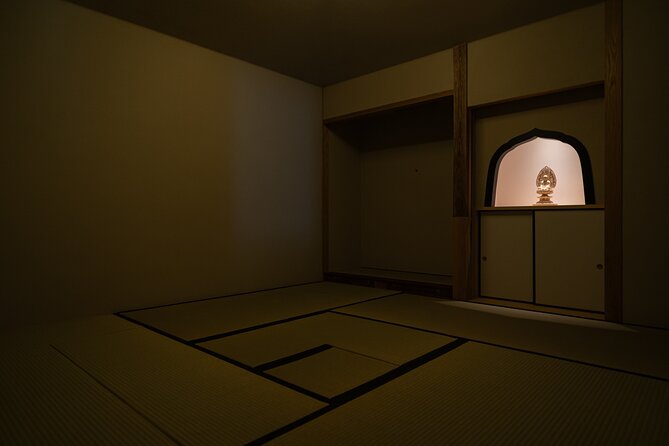
The tea ceremony holds deep cultural significance in Japan, as it’s a centuries-old tradition that embodies the country’s reverence for harmony, aesthetics, and mindfulness.
Rooted in Zen Buddhism, the tea ceremony is a meticulously choreographed ritual that showcases the beauty of seasonal and regional elements.
From the selection of utensils to the preparation and serving of tea, every aspect is imbued with symbolic meaning.
Participating in a tea ceremony offers insight into Japan’s intricate cultural heritage, allowing guests to enjoy the tranquility and refinement that define this timeless practice.
Booking and Cancellation
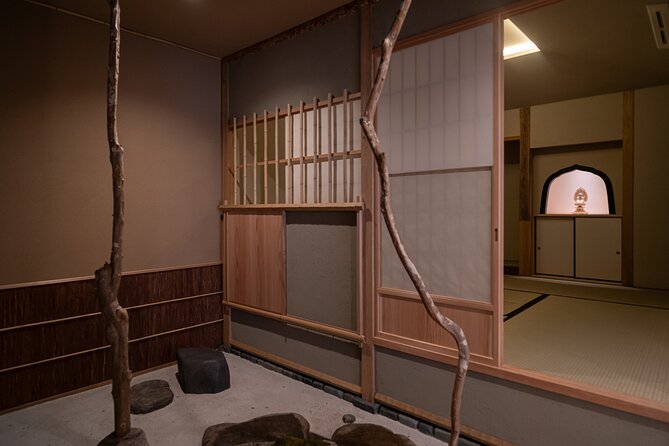
Booking the tea ceremony experience in Kyoto is a straightforward process. The experience is priced at $134.37 per person, with a maximum group size of 7 travelers.
To secure your spot, you can reserve now and pay later, providing flexibility. Additionally:
- Confirmation is received upon booking or as soon as possible if booked within 1 day of travel.
- Free cancellation is available up to 24 hours before the experience starts.
- The activity isn’t wheelchair accessible but is located near public transportation.
- Certain health restrictions apply, and infants aren’t allowed to participate.
Since You Asked
What Is the Dress Code for the Tea Ceremony?
The dress code is not specified. However, it’s recommended to wear comfortable, modest clothing as the tea ceremony takes place in a traditional setting and may involve sitting on the floor.
Can I Take Photos or Videos During the Experience?
Photos and videos are generally not allowed during the tea ceremony experience. This is to preserve the tranquil atmosphere and respect the traditional customs. Participants are advised to fully enjoy the moment and avoid distractions.
Is Gratuity Expected for the Tea Ceremony Host?
Gratuity is generally not expected for the tea ceremony host, as the experience’s cost already includes the service. However, tipping is acceptable if travelers are satisfied with the service provided.
How Long Does the Entire Tea Ceremony Experience Last?
The entire tea ceremony experience typically lasts around 1 to 1.5 hours. Participants will enjoy an explanation of the ceremony, tea preparation, and time to savor the matcha tea and traditional sweets.
Are There Any Age Restrictions for Participating?
The experience doesn’t allow infants to participate, but there are no other age restrictions. Participants must be able to sit on the floor comfortably for the duration of the tea ceremony.
The Sum Up
The Tea Ceremony Experience in Kyoto offers a unique culture, allowing participants to learn about the centuries-old traditions and significance of this Zen-inspired practice. Held in a historic setting, the intimate gathering provides educational insights and a hands-on experience, where visitors enjoy traditional sweets and matcha tea while discovering the four essential elements of harmony, respect, purity, and tranquility.
More Tour Reviews in Kyoto
- Kyoto: Discover Every Bit of Ginkakuji Temple in 60 Minutes
- Private Full-Day Walking Tour of Kyoto
- Hidden Temples in Kyoto a Self-Guided Zen Tour
- 2 Hour Private Tour of Arashiyama Highlights
- Nara 9hr Tour Licensed Guide&Vehicle: Kyoto Pickup/Osaka Dropoff
- Kyoto: Half-Day Private Tour Gion Geisha Districts & Kiyomizu
Not for you? Here's more nearby things to do in Kyoto we have reviewed
- Kyoto: Discover Every Bit of Ginkakuji Temple in 60 Minutes
- Private Full-Day Walking Tour of Kyoto
- Hidden Temples in Kyoto a Self-Guided Zen Tour
- 2 Hour Private Tour of Arashiyama Highlights
- One Way Bus From Kanazawa to Kyoto
- Nara 9hr Tour Licensed Guide&Vehicle: Kyoto Pickup/Osaka Dropoff
- Original Pizza Making Using Kyoto Vegetable at BNR Night Farm
- Kyoto 8 Hr Tour From Osaka: English Speaking Driver, No Guide
- Kyoto: Half-Day Private Tour Gion Geisha Districts & Kiyomizu
- Kyoto Sweets & Desserts Tour With a Local Foodie: Private & Custom
- Arashiyama Autumn Leaves & Sanzen-In Temple Tour From Osaka/Kyoto
- Kyoto: Top Sake Region Tour – 2.5 Hours, 3 Tasting Spots
